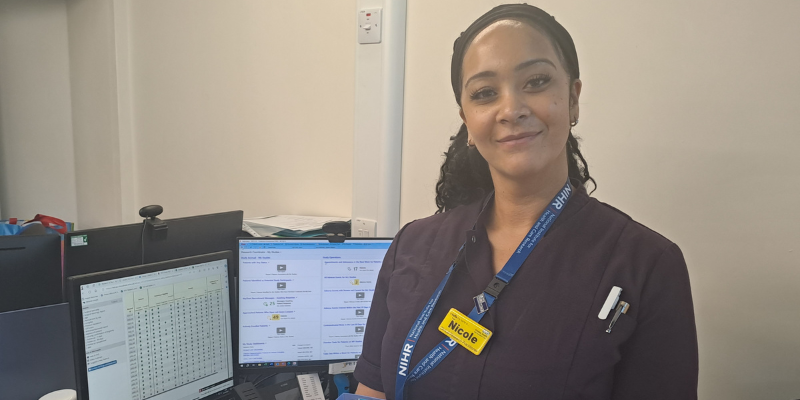Breast cancer is the most common cancer in the UK, with 55,500 cases diagnosed each year.
Statistically, one in seven women will be diagnosed with the disease during their lifetime, and in some cases men will also develop the cancer.
There is a good chance of recovery if it is detected at an early stage, which is why events such as Breast Cancer Awareness month – which is running throughout October – are so important, highlighting what to look for and how to check your body.
Screening programmes, an early diagnosis and improved treatments have all helped provide better outcomes in battling the disease.
Across Frimley Health Foundation Trust, Research and Development are currently running nine clinical studies involving breast cancer, as medical teams research ways to treat early cases and manage treatment side effects for a better recovery for patients.
“The research aims to constantly evolve cancer treatments,” said clinical research practitioner Nicole Kader. “It’s about the best outcomes, and improving patient pathways to the best possible care.”
Nicole is a CRP in Research & Development’s Wexham Park Hospital team and is involved with five of the ongoing studies.
“It’s about finding the best individual care package for every patient,” she said. “There’s no ‘one-size fits all’ approach with breast cancer, and each clinical trial helps us understand the best course of treatment that can be offered for each patient we see.”
The research studies include looking at getting the best benefits from treatments involving radiotherapy, hormone therapy and chemotherapy, as well as surgical options.
For example, neoadjuvant chemotherapy is very effective at shrinking and removing cancer cells in lymph glands.
“The chemotherapy is now able to get rid of cancer that has spread to armpit glands in 40-70% of patients,” said Teena Kunnath, CRP on the ATNEC study at Frimley Park Hospital. “The trial is looking to see if this could mean further armpit treatment, which can have long-term side effects, can potentially be avoided for a patient’s recovery.”
Feedback from patients has shown being involved in a clinical trial can provide a boost as well.
“To be told that you have cancer is scary. But to be part of a study that helps others and informs better treatments makes you feel that you are not alone,” said Julie from Berkshire.
“Feeling I was contributing to help in supporting other cancer sufferers by sharing my experiences was a positive,” added Ann from Slough.
Ruth O’Connor worked as a breast cancer nurse specialist at Frimley Park Hospital for 12 years, and is now an advanced nurse practitioner for breast cancer at the Trust. The new role is another example of how treatment is always evolving, in this case helping to provide an earlier and faster diagnosis.
“My job involves seeing and assessing patients referred by their GP with breast symptoms. The 28-day faster diagnosis standard will ensure that patients will be diagnosed or have cancer ruled out within 28 days of being referred for suspected cancer. I’m part of a multi-disciplinary team who work together to maintain high standards of care and treatment for patients,” she said.
“Treatment and care have changed and improved over the years, and we’re always refining what we can do to provide the very best outcomes for patients.”
Advice for anyone with new breast symptoms or concerns is to contact their GP. For information on self-check awareness, visit https://coppafeel.org/.
For information about joining a research study, call 0300 613 2441 or email fhft.research.development@nhs.net.


